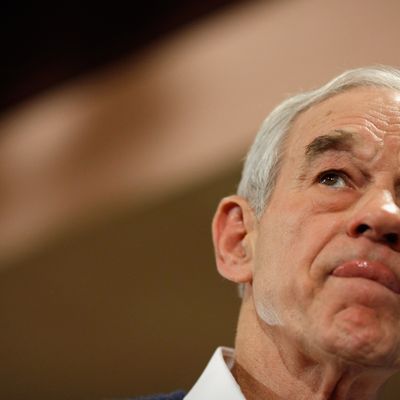
Ron Paul has coyly batted away questions about a potential third-party run, prompting frequent speculation that he might launch an independent bid. But Paul is almost certainly just trying to increase his leverage. He has been a loyal ally to Mitt Romney, his influential chief ad-maker is married to a Romney consultant, and, as Amy Gardner reports, Paul and Romney have developed a close friendship:
>Despite deep differences on a range of issues, Romney and Paul became friends in 2008, the last time both ran for president. So did their wives, Ann Romney and Carol Paul. The former Massachusetts governor compliments the Texas congressman during debates, praising Paul’s religious faith during the last one, in Jacksonville, Fla. Immediately afterward, as is often the case, the Pauls and the Romneys gravitated toward one another to say hello.
Not to mention the fact that a Confederacy-loving, pro–John Birch Society, 1964 Civil Rights Act and Martin Luther King Day–hating paleolibertarian who feels ideologically comfortable with white supremacists (all for entirely non-racial reasons, of course!) is not going to want to help reelect Barack Obama, which a third-party candidacy would all but guarantee.
Not to mention the fact that a Confederacy-loving, pro–John Birch Society, 1964 Civil Rights Act and Martin Luther King Day–hating paleolibertarian who feels ideologically comfortable with white supremacists (all for entirely non-racial reasons, of course!) is not going to want to help reelect Barack Obama, which a third-party candidacy would all but guarantee.
Paul’s game is to trade his supporters for a seat at the Republican table. Gardner has some good reporting about his efforts to cultivate serious long-term sway within the GOP. His followers are burrowing within party organizations across the country.
This will create an interesting tension within the existing party coalition. There’s little direct disagreement within the Republican coalition about policy — neoconservatives dominate foreign affairs, supply-siders control economic policy, and religious conservatives hold sway over the judiciary and other social policy. The disputes arise in settling priorities. Economic conservatives have increasingly come to dominate the party, and the growing influence of Paul raises the possibility that the party will come to be defined almost entirely in economic terms. That is the explicit goal of figures like powerful senator Jim DeMint, who welcomes Paul’s influence:
The debate in the Republican Party needs to be between libertarians and conservatives, that’s what our party needs to be about. There’s no longer room for moderates and liberals because we don’t have any money to spend, so I don’t want to be debating with anyone who wants to grow government.”
Meanwhile, you have figures like Bill Kristol, who cares mostly about foreign policy, some about social issues, and is pretty much willing to go along with any economic policy that advances those other goals. Kristol sees his allies being relegated to second-class status, and he does not like it one bit:
“A lot of people when they criticize Ron Paul have to preface their criticism by saying, ‘you know, he’s good guy, he brings a lot to the debate,’” Bill Kristol said on C-SPAN. “I actually don’t buy that. I do not think he’s a particular good guy … I think it would be better for the Republican party, if he left the Republican party.”
That’s not going to happen, at least not during this election cycle. The question will arise if Romney wins, and Paul has to decide where and how to exert his newfound influence. Romney might offer some nice words about Paul’s goldbuggery now, but there’s no way he would ever give even a smidgen of influence to a crank economic theory if he’s in office and has political skin in the game. He’s also taken a staunchly nationalistic, hawkish line on foreign policy. Would Paul have a fuss over these things, or be content to just push harder for tax and spending cuts?






























